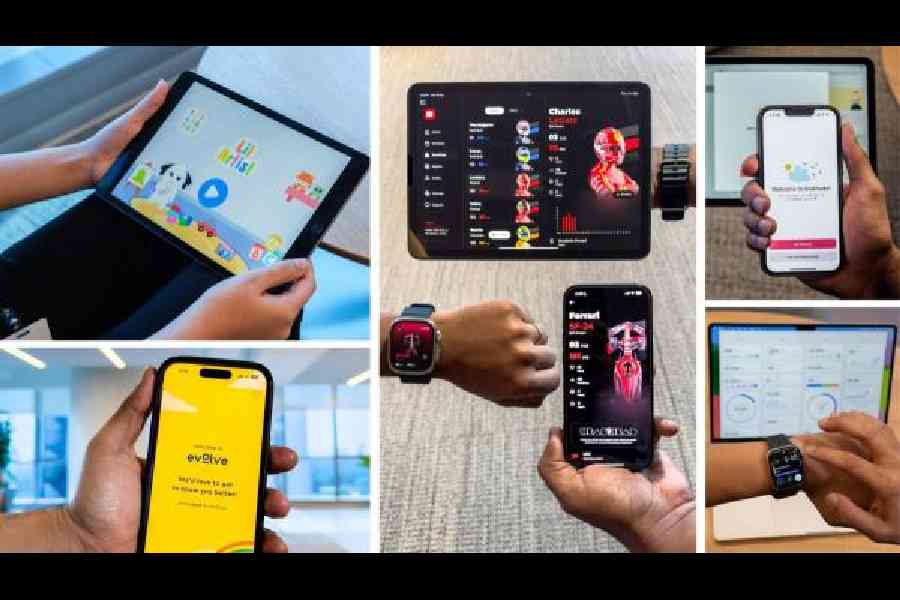Apple hardware ecosystem keeps getting powerful but the secret sauce to the company’s success has always been developers. Starting June 10, Apple will host its annual Worldwide Developers Conference, which is like Christmas for developers. Ahead of the big event, we met the people behind five apps from India, all of whom have received encouragement from Apple’s Developer Centre in Bangalore. It’s here that developers in the region find greater access to Apple experts and resources to take their apps and games to the next level.
Designed for teams of all sizes and at all stages of app development, Apple Developer Centre is for developers to hone their skills and transform the design, quality, and performance of their apps across iOS, iPadOS, macOS, tvOS, visionOS and watchOS.
Apple CEO Tim Cook, during the company’s second quarter earnings call, touched upon the magic developers are creating: “We’re continuing to expand our channels, and also working on the developer ecosystem. And we’ve been very pleased that there is a rapidly-growing base of developers there. And so, we’re working all of the entire ecosystem from developer to the market to operations, the whole thing. And I just... I could not be more excited and enthusiastic about it.”
Let’s meet the developers and their apps.
Gratitude: Jot down your thoughts
Six years ago, software engineer Pritesh Sankhe faced a series of personal and professional challenges. His father had suffered professional setbacks, his mother had her health issues, his sister was having relationship struggles and, on top of that, he was dissatisfied with his career.
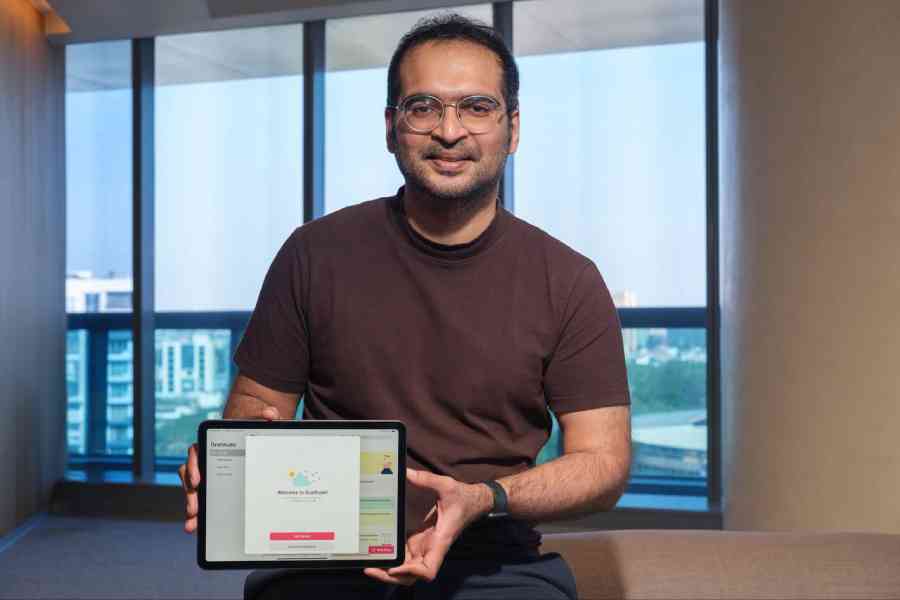
Pritesh Sankhe, developer of the health and fitness app Gratitude. Picture: Apple
“During that time, I just felt that we were caught in the negative spiral with no hope of bouncing back,” says Sankhe.
He came across Rhonda Byrne’s book The Secret, which underscores the transformative impact of the law of attraction. However, it was the book’s emphasis on the power of gratitude that particularly resonated with Sankhe. “It led to a very simple but profound realisation that in our busy lives, we focus so much on the things that we lack that we forget to look at the abundance that surrounds us. That realisation was very solid for me; I started looking for things that I could be thankful for. So I started finding things to be grateful for like my evening walk, the food that I ate, or a conversation with a friend. And these were my initial journal entries. These were written during the tough phase I went through.”
It also sparked the idea for Gratitude, one of the best iOS apps for jotting down thoughts. Coming with a friendly design, it asks you simple questions but the effect can be profound. Consider the power of a simple prompt: “Pick up a recent photo from your gallery and describe the moment it captured” or “What sound in nature did you appreciate hearing recently?”
Sure, the app enjoys a 4.9 rating on the App Store across 75K ratings and it has reached over five million people around the world but Sankhe’s dream is far more powerful than mere figures.
“I thought I could help other people to focus on gratitude. Being a mobile engineer, I developed a simple app to record what one was grateful for and set up reminders. Over time, my team and I brought in a bunch of other elements that helped users enhance the practice,” says the young engineer who says the app is profitable and has a subscription model in place.
The benefits of gratitude and journaling may not be entirely tangible but one can safely say it makes life notably better. It helps to find motivation as well as stave off jealousy. You will be able to remember more of what happens throughout “another” day, and you will be able to focus on the good things that happen throughout the weeks and years.
“This is my journal, my happy place. It’s about the people I am grateful for and the people I love,” says Sankhe.
The app captures moments that generally go unnoticed. “We try to remind you by like: ‘Hey, write about this.’ That’s the gratitude part. Then there are people who are new to the practice, like they come up with new year resolutions. So for them we have something called guided challenges.”
What Sankhe realised during his tough phase is that his dialogue with himself was broken. “I used to ask myself why bad things happen to me and am I worthy of happiness. Such thoughts were self-defeating and filled with self-doubt. And that’s when I realised that affirmations are something that can help you. Think of it as a compassionate friend, who will tell you: ‘Hey, you know what, you’re worthy, you have your strengths, and your capacities to overcome difficulties.’ This is something that I wanted to bring into the app.”
Gratitude will be incomplete if we don’t talk about the well-designed blog it comes with; it attracts over half a million people every month.
It’s not just the iPhone where you can use the app; there is Apple Watch integration using which you can, say, add a voice memo. Sankhe is currently working on a Mac app.
He says that the Apple team guided him when it came to interface guidelines. “Our components were all over the place. We had a very limited iPad experience, and the Watch app was non-existent. We now use Swift UI and we’ve particularly been embracing accessibility and inclusivity.”
Gratitude has a substantial user base in the US, Canada and Europe but India too is embracing the app. “It’s growing and a lot of people are coming to our blog to understand what Gratitude is.”
Evolve: A supportive community
Ludhiana to Agra to Michigan, there’s plenty of guilt attached to sexuality. Bringing regret and confusion off the saddle is the app Evolve, the brainchild of Anshul Kamath and Rohan Arora.
The app has a strong focus on LGBTQ+ audiences with curated content and offerings specifically for members of the community. “A lot of people go through this internalised shame, stigma, fear of being rejected and a lot of bullying,” says Rohan. The app has been able to address the needs of at least a million users and the pace hasn’t slackened.
“Anshul started his journey in London in a big company and had a very stable life. But he wanted to be more entrepreneurial. So he came back to Bombay, joining startups around product and tech, but somewhere in his journey, he got detected with an autoimmune disease, which forced him to get deep into his health, both physical and mental,” says the co-founder of the app.
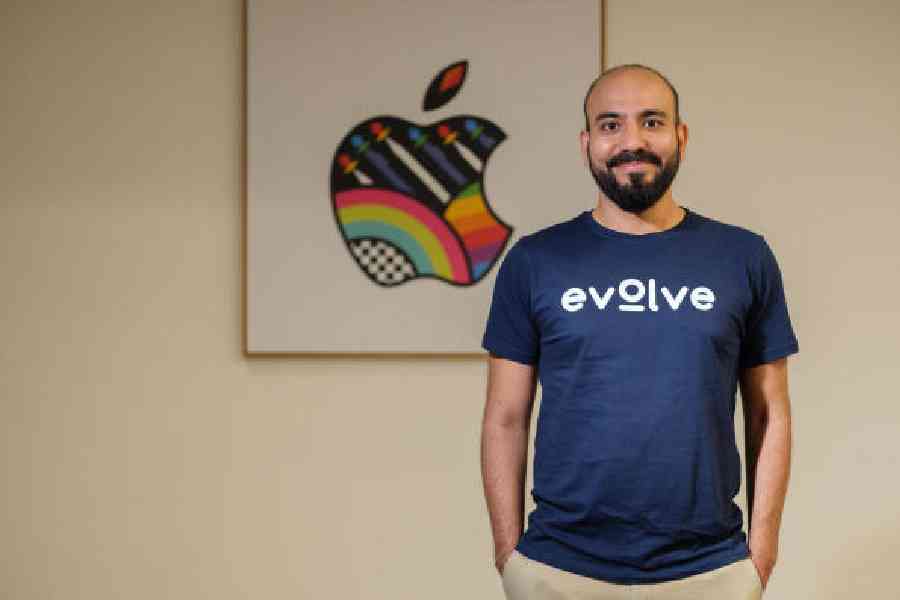
Rohan Arora, developer of the health and fitness app Evolve Picture: Apple/Chenthil Mohan
Though mental health is the backbone of the app, it focuses on the LGBTQ+ community. The two met in Mumbai at a wine-tasting event in 2019. “The pandemic being a year away, mental health hadn’t hit inflection point. We started talking, and I was deeply interested in what he was doing.”
For two years conversations continued and enough trust was built to move away from their corporate gigs, says Rohan who is an engineer from BITS Pilani and has also done an MBA from IIM Ahmedabad. “Evolve has become my personal mission and responsibility. I grew up as a gay man in India, in a very closeted space. I was not comfortable because there was so much internalised shame. And there’s so much stigma around it. Thankfully, when I moved to Bombay, I met a lot of people, spoke to them who are part of the community. And I discovered that they were living their dreams; they became my role models.”
Evolve, says Rohan, focuses on three Cs. “Content comes first. Second is community. We have a supportive community because for marginalised and susceptible communities, providing camaraderie normalises many experiences. We are also doing expert-led coaching. Evolve now has one million users all over the world and Apple has been helping us improve the app and its design.”
He has a point when he says fear runs deep among community members. “The people who are supposed to love you the most, if they reject you, the problem increases. Members of this community are more prone to mental health challenges by about four times… through anxiety, depression, suicidal ideation, drug abuse, substance abuse, sexual risk-taking behaviours as well.”
In the app there are different techniques to cope with challenges, like a breathing technique called single-nostril breathing. Then there is help for members who are coming out. “We have our own psychologist, we have someone who has a PhD in psychology and a whole team to bring in the theoretical knowledge along with the lived experience.”
The app keeps privacy at its heart and it doesn’t ask anybody for age in the beginning or their sexuality. “We don’t exclude anybody. We also don’t exclude people who are not from the community, because you might be questioning, you might be exploring. We don’t say that this app is an ‘exclusive’ app. We call it an ‘inclusive’ app.”
Rohan points out that the app has plenty of users from the US, the UK and also India. “We have just scratched the surface. There is an 18-year-old who wanted direction on the subject of bisexuality. I was speaking to somebody called James and he’s a pilot from the US. He said even in the US there is shame attached to sexuality. We hired our first employee from outside India. She lives in Mexico and had been using the app for 334 days at a stretch.”
Box Box Club: Hyper-personalised fan experience
Box Box Club is a good example of how Apple’s interaction with developers can change lives. Founded in May 2022 by Bangalore-based duo Ranjith Ramanan and Kamal Kumar Lakshmanan, the app’s objective is simple — giving Formula One fans a unique experience.
“It started as a passion project and then Apple’s Developer Centre and the App Store entered the picture. We quit our day jobs and now have employed a small group of people,” says Ranjith, who is a seasoned designer.
Launched first as an iOS widget, Box Box has become a dynamic mobile application that almost every Formula One fan must have. The duo has seamlessly navigated the Apple and Android ecosystems.
Ranjith started his career with advertising agencies and then spent time with MNCs. Being a Formula One fan, he faced a problem — time zone difference, syncing with the calendar and finding the schedule. “At first I thought it was a problem only I faced. But I soon found out that it was affecting other users. I got an opportunity to watch the sport in person at Bahrain Grand Prix in 2022. After I returned, I worked on some basic concepts and then I put it out on Twitter, asking users if they wanted to build the product. That is when Kamal responded,” says Ranjith.
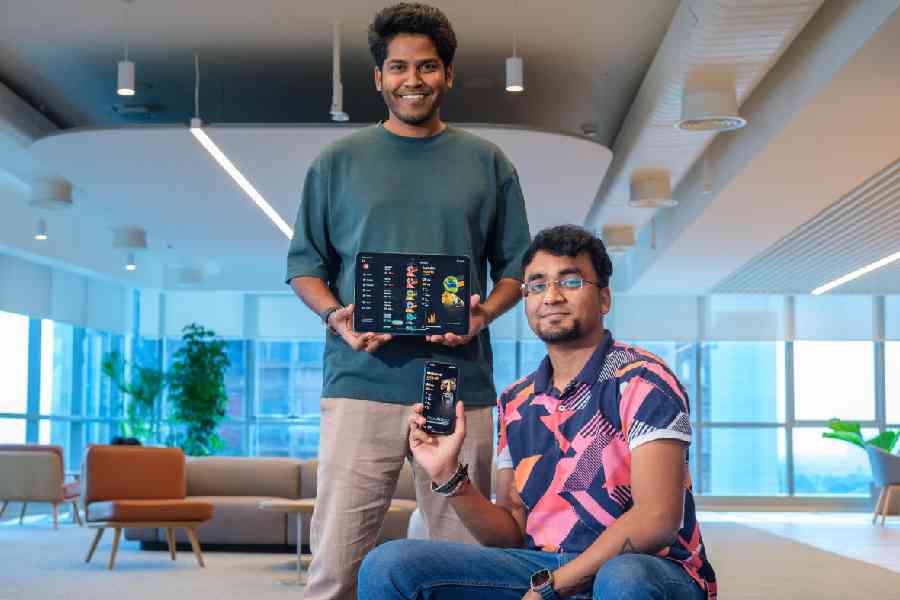
Ranjith Ramanan and Kamal Kumar Lakshmanan, developers of the sports app Box Box Club, during the Developer Showcase event held in Bangalore
Kamal has been developing iOS apps for more than a decade. “When I am not developing apps, I follow Formula One. Besides the challenges Ranjit pointed out, I wanted to follow a particular driver and a team. Hyper-personalised fan experience was lacking. When I saw his designs on Twitter, I felt a connect immediately. We met in April 2022 and a month later the app was launched,” says Kamal.
The idea was to cater across age groups. “Fans can follow every session in their local time zone. We have added a lot of features, creating your dashboard to follow news and getting weather updates. Once we launched, users could see how two drivers were moving along their career trajectories. We immediately had 5,000 downloads. We kept building the app and kept listening to the community. Being a technology guy, I wanted to add more features. We added a lock screen widget and users loved it,” says Kamal.
Next, a few of the loyal users shared their wallpapers on social media, encouraging other Formula One fans to get the app. “We had 250,000 downloads in a matter of five days.”
The app is currently available in 175 countries and supports 11 languages. “We are not just building a company, we are building a community. We talk to our users,” says Ranjith.
The duo are constantly listening to users and did a wonderful job with the Live Activity feature on the iPhone in 2022. “So users, even if they’re not watching the race, were able to follow it closely lap by lap, the top three drivers of that particular session and more. Even when they’re on the move, we created this Apple Watch app in which you can follow your driver’s schedule and everything right on the Watch.”
Box Box Club takes advantage of the iPad, iPhone, iMac and even Apple Watch. “We are a design-led engineering team where technology is at the forefront.”
Of course, it would be remiss on our part to not mention that Juan Manuel Correa, who is currently competing in the 2024 FIA Formula 2 Championship, is a strategic partner for Box Box Club.
Numerics: making sense of your data
Apurva Roy Choudhury is no stranger to Apple hardware and app development. He is the man behind the app Numerics, which unifies metrics that drive your work and life into dashboards, and he is the CEO of Cynapse, which he started in 2001.
“In those days, being a tech company in India was all about being the next Infosys or Wipro, whereas our focus was on how we can innovate, build products and sell to a global audience,” says Apurva.
When the App Store came along, it kind of eradicated piracy. “It created a level playing field where you could build a great app, and be in Bombay while competing with a Silicon Valley startup. You could distribute to all countries sitting anywhere.”
The goal of Numerics is to offer tools that unify your data with your life in meaningful ways. “We started focusing, for the better part of the last 10 years, on Numerics, which is our core product. The goal of Numerics is to track numbers that matter. When we were kids, whoever had more data was more powerful. But right now, there’s an overabundance of data. We have a lot of tools, we have a lot of data everywhere. And we’re resorting to gut feel when making decisions, which could be data-driven. I’m not saying every decision is data-driven but a lot of decisions, especially business decisions around your work, should be data-driven, especially when it comes to teams. The idea of Numerics is to get numbers that matter to you, unify them in beautiful-looking dashboards and make them accessible everywhere.”
Customers of Numerics include teams (and not the organisation) from Apple, Amazon, Salesforce and Walt Disney. But its most avid fan base is formed by small businesses who believe in using technology and giving themselves an upper edge by investing in better technology.
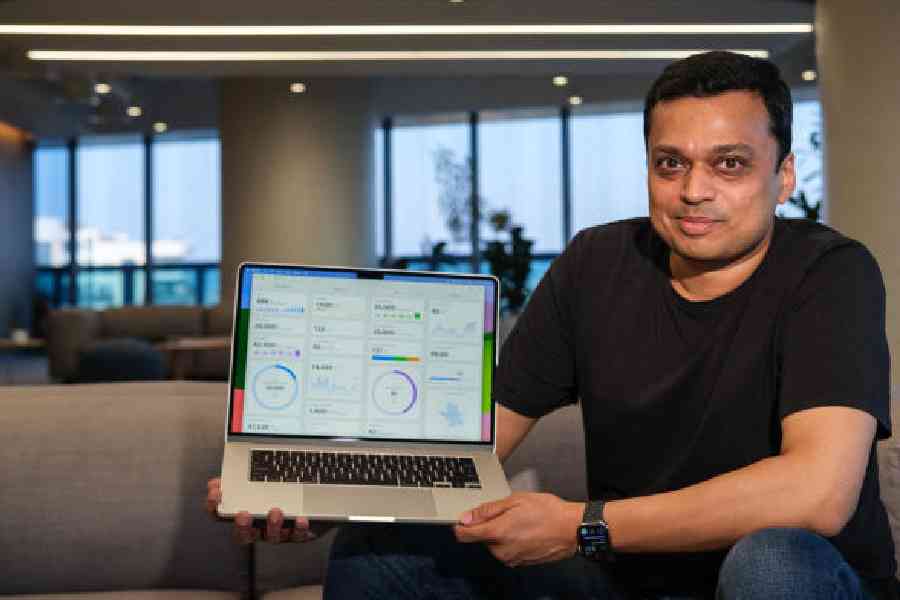
Apurva Roy Choudhury, developer of the productivity app Numerics
“One of our key focuses is that our user is our customer. We’re against advertisement-driven software. So we’re bootstrapped and want users to pay for the good stuff. One of the reasons why we focus exclusively on the Apple platform is because we think that Apple’s customers are aligned with the ideal customer profile that we want to focus on. We use Apple technology very deeply; we’re the only dashboard app on the planet that does not have a server side. Numerics has no servers in between. So it’s making direct connections from your device to your Salesforce server, or to your Google Spreadsheets account. And storing it on your iCloud. When you share with your friends or colleagues, you’re using iCloud sharing, and it’s end-to-end encrypted. So neither Tim Cook nor I can have access to your data. And the other value proposition is we deeply integrate with all the Apple stuff. So we’re everywhere,” says Apurva.
He is proud of the fact the Numerics is crafted for each Apple device. It was among the first 200 apps on the Apple Watch and he got invited to Cupertino. “We released it for Vision Pro. Again, we were among the first 600 apps.
Lil Artist: Catch them young
The pandemic showed the power of learning apps for children, like Lil Artist. Behind it are Arima Jain and Aman Jain. Arima primarily takes care of the design element while Aman is an iOS developer. Together, they have made this one of the best apps for children.
“My journey started with graphic designing when I was in Class XI. And later, Aman, my brother told me about WWDC Swift Student Challenge and iOS development. So I started learning SwiftUI, and I participated in WWDC Swift Student Challenge in 2022. Fortunately, I won. Winning the challenge further fuelled my interest and passion for Apple technologies. We came up with the app when we observed an increase in children’s screen time after the pandemic, but we noticed they were consuming content without getting much from it. So we decided to create something enjoyable, yet educational. And that’s when we came up with Lil Artist,” says Arima.
The game has plenty of storytelling, learning different musical instruments, drawing, handwriting and a lot more. One of the interesting components of the app is AR. In fact, the duo are constantly adding new features.
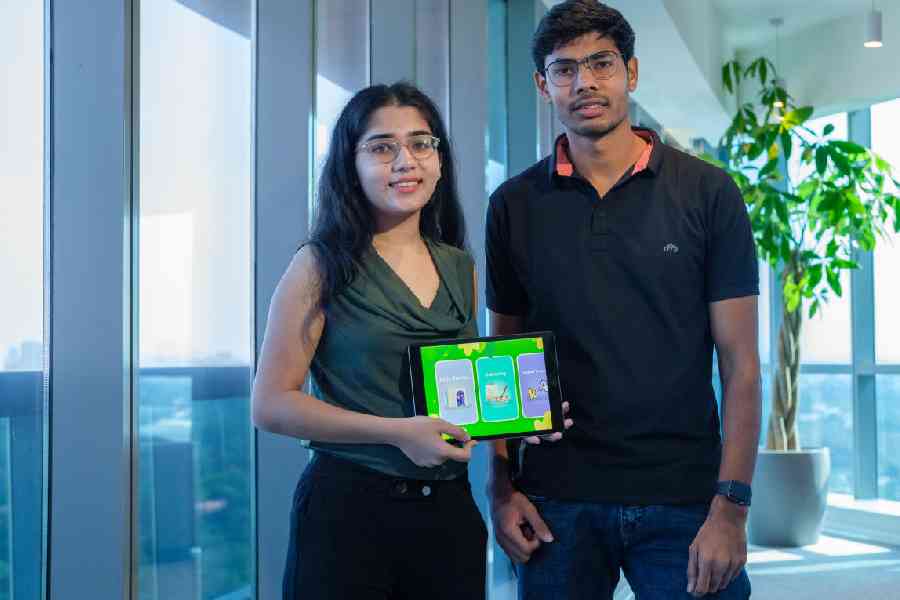
Arima Jain and Aman Jain, developers of the kids learning app Lil Artists
“Our key focus is on integrating augmented reality (AR) features into our app. These AR features will take learning to a whole new level of fun and interactivity.We’re excited to explore innovative ways to integrate Apple’s latest technologies. Our ultimate objective is to create visually stunning and user-friendly interfaces that provide iOS users with seamless experience.”
Aman is a self-taught iOS developer. “I started my journey when I was in college,” says Aman, who is a WWDC Scholar from 2016. “Going forward, we are going to introduce more AR-related elements, which kids enjoy. And we are constantly looking for new features from Apple.”
Both are always excited to meet other developers, which makes working with Apple special. For Arima, things are changing fast as she has just completed Class XII and is now busy with college. They say being a part of the “Apple Entrepreneur Camp has been a game-changer.”

